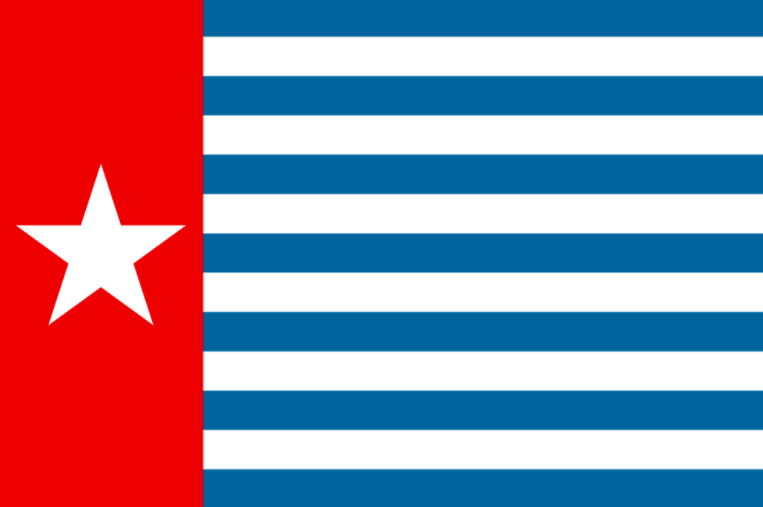2020 marks 75 years since the Southeast Asian nation of Indonesia gained independence from the Netherlands. Though under Dutch colonial rule for three centuries, the Dutch language hasn’t been used as a lingua franca, as it has been in fellow, former Dutch colony Suriname. However, don’t take this as a sign that Jakarta is inherently anti-colonial. Why? First, their belligerent occupation of the former Portuguese Timor, which led to one third of the population being wiped out between 1975 and 1999. Second of all, their colonial regime in the Western New Guinea, known as West Papua, which will be the main topic of this post.
It has been eighteen years since Timor-Leste re-established their independence, but marks fifty-one years since Indonesia officially began its colonial rule of Western New Guinea. In 1969, the United Nations conducted the Act of Free Choice, an independence referendum. As stipulated in the New York Agreement between the Dutch and Indonesians in 1962, this would follow six years of Indonesian administration under the international body’s supervision. As you might expect, the Indonesian military interfered in the process. Handpicking a thousand out of 800,000 of the indigenous population, this vulnerable minority was intimidated into voting against the will of 95% of their population.
Though the Netherlands did express skepticism over Indonesia’s capabilities at governing a territory with people whom they had no historic, ethnic, or cultural similarities to, Jakarta used the argument of anti-colonialism to justify their eventual colonization of Western New Guinea. In contradiction to Jakarta’s anti-colonial rhetoric about West Papua, they signed a contract with an American mining company to exploit the rich resources of the territory in 1967. This was in disregard of the reality. The reality that the territory was pending de-colonization under the temporary administration of Indonesia’s. It was also two years before the Act of Free Choice, where Papuans were given the right to either consent to Indonesian rule, or become independent.
Why would they sign a deal to exploit the resources of a territory before its’ indigenous people were going to vote in an independence referendum? Given their statement that Indonesians and Papuans were unified in the suffering they endured under Dutch rule, how does the Jakarta regime justify the imposition of the colonial regime they claimed to be against? At the very least, it was a continued exploitation of the indigenous people whose natural resources are the root behind Jakarta’s conquest, as the Dutch’s domination of Indonesia. It may be a brown country, but it will never make the 51-year crime against humanity that they’ve been committing against the indigenous population any less egregious than what the Dutch imposed on them for three centuries.
Not surprisingly, as a former Dutch colony and a Western-backed colonial regime, Jakarta has exploited the rich resources of the region while racking up countless abuses against the indigenous population. As multinational corporations are free to exploit the gold and copper mines, their Papuan majority workforce are paid just $1.50 per hour. Given that the billions of dollars in profits inevitably goes back to the Jakartan tax base, this would contribute to the extreme poverty in the provinces of Papua and West Papua. And you may have predicted, Papuans aren’t the beneficiaries of those resources. Who knew the anti-colonial paradise of Indonesia would continue to perpetuate the colonial-era policies that had once oppressed them under Dutch rule? As Indonesia Investments described it, “Javanese peasants had to hand over one-fifth of their harvests to the Dutch. In return the peasants received an arbitrarily fixed compensation in cash, which basically had no relation to the value of the crop on the world market.”
Multinational corporations are notorious for participating in the exploitation of resources under unjust circumstances and any threat from the pesky natives to the Western-backed status quo is brutally quashed. As the governance of Indonesia over the territory is clearly colonial, indigenous resistance is inevitable. Civil protests, as seen in 2019, and armed attempts at resistance often result in further repression from the Indonesian forces. Furthermore, Indonesia’s abuses against the population have amounted to torture, rape, and killings in West Papua. According to Free West Papua, “Many Papuans live in a constant state of fear and intimidation. People living in villages across West Papua can at any time be subject to military sweeping operations.” In addition to this, Papuans have also endured the colorism that comes with being a part of a Southeast Asian nation.
As Western New Guinea is ethnically, culturally, and historically more similar to Papua New Guinea and the Oceania region than Indonesia, support from these countries has been significant. In the neighboring country, the governors of both the Oro Province and National Capital District have expressed explicit support for their cause. In addition, Prime Ministers, Peter O’Neill and James Marape, have expressed concern over the human rights situation in the territory. Though Pacific leaders have just expressed concern, the government of Vanuatu went a step further; it has become a prominent ally of the Papuans, supporting their right to self-determination. With every opportunity at international forums, Vanuatuan officials often use their power to spread awareness about the cause. Despite gestures at solidarity from the Prime Ministers of Vanuatu and Tonga, the same cannot be said for the Prime Minister of the Netherlands. During his visit to Indonesia, PM Rutte paid lip service to those concerned over the situation, while expressing support for Indonesia’s continued control of the territory.
Though Western New Guinea was successfully annexed as a Indonesian colony, it doesn’t make its cause any less legitimate. As the press faces restrictions in the territory, information can be tightly controlled. I suggest that you check out Veronica Koman, an Indonesian lawyer currently exiled in Australia; she regularly posts about the situation, which has made her a target of the Indonesian government. In addition, check out Benny Wenda and his campaign Free West Papua. As the former Portuguese Timor managed to gain their right to self-determination in 2002, the people of the former Netherlands New Guinea continue to fight for that right to this day. Western New Guinea was successfully annexed in a way that Timor-Leste wasn’t, so it’s important that their cause for self-determination remains visible in the hope that they will one day achieve that inalienable right.





